#heroes of trojan war
Explore tagged Tumblr posts
Text
What Modern Audience thinks: Odysseus was so brave he put himself before a friend (usually Polites) to save him from the boar and got hurt!
What Homer wrote: Yes basically my beloved genius-idiot was a little dumpass who miscalculated the boar's speed and the boar got him!
#greek mythology#odysseus#the odyssey#tagamemnon#odyssey#homeric poems#homeric odysseus is just its own thing!#homeric epics#homer odyssey#funny#humor#homer writes so realistic characters!#like Odysseus being young and enthusiastic and he miscalculated#homer's odysseus#homer's odyssey#heroes of trojan war#seriously let geniuses make silly miscalculations and mistakes! It is human!#greek mythology memes#odysseus was human#I just LOVE Homer's Odysseus! he has so many sides! even the silly ones!#epic#epic cycle#the boar of parnassus#parnassus#homer odysseus#poor ody! 😅
301 notes
·
View notes
Text
Alright...alright ALRIGHT! oh my freaking goodness! So much to unravel here and it so pains me to have only 140-ish notes! This amount of work to synthesize this is worth at least 13.000 I swear! Either way there is a lot to unpack so let's see!
For starters I love the mixture between anatolian and greek features here. We know the location of Troy but we also see the Trojans speak the same language and worship the same gods as the Greeks in the Iliad which is very interesting. Not only does it create a closeness with each other (and we know it is not your typical story "them vs us" thing but a more complicated matter than that) but could also potentially wink to the first taking of Troy by Heracles like one or two generations prior. The conquests of heroes in greek mythology were about the spreading of hellenic culture and conquers or colonies created by the greeks in the lands they conquered or moved into. Heracles conquered Troy once which signifies the entrance of hellenic culture in Troy.
Particularly I love the beards that they have looking like a mixture of Assyrian and western. Hecuba looks amazing next to her husband and Priam looks fantastic too! I also feel for poor Kassandra here who is staring to the upcoming doom and cannot stop it (that was an interesting choice of hair that you gave her hehehe) and Polyxena too! She looks so young!
I think Paris and Helenus are some of my favorites of this! So great harmony to their colors! Paris also looks like a little brat here! Hahahahahaha! But he is pretty alright! Hahahahaha! And my oh my Deiphobos looks scary! No wonder that poor Helenus got offended when he didn't get Helen as his wife! XD The regal looks of Andromache and Laodice also look so great!
Now Troilus is intersting! Hahaha he almost looks like an albino! But I can see you try to bring out his godly father's nature here with the pale blonde hair and all. Oh my poor Sinon! Hahahahahaha! He definitely got the wrong end of the stick here! Hahahaha! And what a creative look for Pandarus! The shaved or balding heads are not used very often to art like this so this was really creative (as well as with Deiphobos)!
From the allies Eurypylus looks so ominus and Sarpedon looks so much like Zeus! So great way to show family resemblance! As well as Aeneas again the choice of hair color is to connect him with Aphrodite? Interesting colorism! I think though my favorites are Memnon and Penthesilea! I love how you make the ethnicities righthere and Memnon looks GLORIOUS! Powerful and strong king of Ethiopia, the guy that literally named the epic poem Aithiopis! And Penthesilea! Man that violent laughing look exactly as she was supposed to be described in poems like Posthomerica! Making other terrified of her and yet we also see how beautiful she is (the face that even post-mortem made Achilles fall over the hills in love with her)! I love her tattoos inspired by scythian tribes again! So accurate given how often Amazon warriors were linked to the area of Scythia!
Now for Helen I can see why you are proud of her! She looks fantastic this way! Interesting choice of hair color given how most sources speak of her and many people connect her hair with blonde color instead of red (see Dares the Phrygian elleged accounts) but I love this straubery color stands up as well as her eyes The roses suit her perfectly in the background and I like how you try to bring some of the age she ellegedly has here (I estimate around her final 30s)
Good you didn't include poor Astyanax here! People would bawl their eyes out! TT-TT

Trojan War - the Trojans
The sister piece to my chart on the Achaeans. Out of the two, this is my favourite. I spent so many hours on Helen and I'm so proud of how she turned out.
#greek mythology#greek myth art#greek gods#ancient greece#iliad#the iliad#homer's iliad#trojan war#paris#paris of troy#hector#hector of troy#priam#aeneas#helen#helen of troy#helen of sparta#classical literature#classical mythology#amazon#art#illustration#cassandra#olympians#goddess#god#troy#penthesilea#heroes of trojan war
165 notes
·
View notes
Text

Ajax and Cassandra by Solomon Joseph Solomon (1886)
#solomon joseph solomon#art#paintings#fine art#19th century#19th century art#academism#academicism#academic art#painting#english artist#british artist#mythology#greek mythology#trojan war#ajax the lesser#cassandra#greek heroes#classic art
15K notes
·
View notes
Text
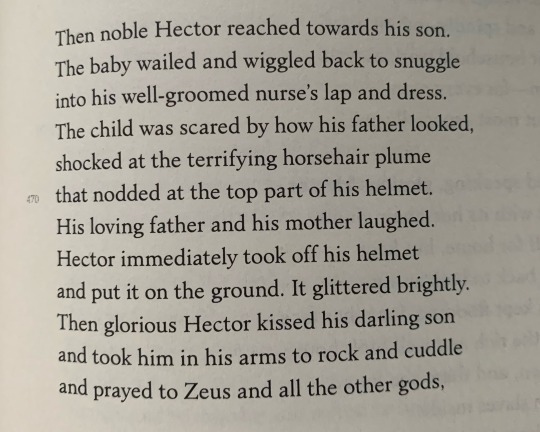
IM NOT GONNA CRY IM NOT GONNA CRY IM NOT GONNA CRY IM NOT GONNA CRY IM NOT GONNA CRY IM NOT GONNA CRY IM NOT GONNA CRY IM NOT GONNA CRY IM NOT-
#ladies and gentlemen I give you my favourite moment in the iliad#hands down no questions asked#it’s just so human#this is a story about war and destiny and gods and heroes and glory etc etc#and here we just get to see a moment of a man with his son and wife#hector and andromache laugh at astyanax’s reaction#Hector takes his helmet off so he can cuddle his son#knowing that this may be his last time to do so#fuck#FUCKK#when astyanax is described as beautiful as a bright star#if I think about hector and his family for too long I get so so sad#I love them I really do#they deserved so much better#hector of troy#andromache of troy#astyanax#scamandrius#the iliad#the trojan war#tagamemnon
312 notes
·
View notes
Text
Favoritism
Nester: *gently shakes Odysseus* "Ody... time to wake up you silly sleepyhead, we are needed for a night mission"
Odysseus: "Mmh.. just five more minutes...."
Nester: "Alright, whatever's most comfortable for you, rest is very important :)"
Nester: *looks over to Diomedes, kicks the dude awake* "Wake up you lazy sack of shit, all you ever do is sleep like the disappointment you are, you aren't half as much worth as your father was, get up and make yourself useful for once I don't even know why you are still here-"
#BRO WAS CONSTANTLY TARGETED FOR NO REASON 💀#THE BEEF WAS REAL BUT UNDESERVED#diomedes#the iliad#nester#odysseus#homer's iliad#ancient greek mythology#greek myth#greek mythos#greek mythology#trojan war#ancient greek memes#ancient greek#greek heroes#greek mythology memes#greek memes#greek tumblr#greek posts#inaccurate quotes#tagamemnon
431 notes
·
View notes
Text
Terrible Fic Idea #92: Percy/Apollo, but make it The Trojan War
Into every fandom, a time travel fic must fall - or in this case a second one, because I somehow got to thinking about the delightful PJO trope of Percy being thrown back in time to The Trojan War and realized that doing so misses out on a fantastic opportunity.
Or: What if post-TOA Percy Jackson and Apollo time travel to shortly before The Trojan War?
aka the Tried To Change The Ending fic
Just imagine it:
Everything follows canon through TOA, with one exception: rather than struggle to catch up in the mortal world following the Second Gigantomachy, Percy elects to stay at Camp Half-Blood. There he can homeschool at his own place with programs tailored towards ADHD children and still visit his family on the weekends - and not get into any more ridiculous situations in the mortal world when one of the gods kidnaps him or sends him on a quest to find their sneakers.
This, naturally, stresses his relationship with Annabeth - who, now that she's no longer living at camp full time, calls it the easy way out. But Percy is tired and struggling in mortal high school where everyone thinks he's a delinquent idiot when another option exists seems foolish. Percy and Annabeth break up and drift apart.
Enter Apollo, fresh from his latest stint as a mortal. He's trying to do his best by his children, which includes popping by camp as often as he can get away with - which in turn means spending a lot of time with Percy, who at this point is unofficially running CHB because it's not like Dionysus or even Chiron have done a brilliant job of it in recent times.
(First aid, strategy, and mythology classes are made mandatory. Percy personally ensures every demigod knows enough about self-defense to be able to survive long enough to run away or for help to arrive. Bullying is cracked down on so hard that it's this, not Percy's generally parental nature, that has people calling him Camp Mom.)
Percy and Apollo become friendly. Enough so that some of Apollo's kids assume they're dating and keeping it on the down-low so as not to draw Zeus' ire. Or Poseidon's. Or anyone else's. It's on one of their not-dates that they're yeeted into the past, without warning or explanation.
And so 19-year-old Percy Jackson and post-TOA Apollo find themselves in Ancient Greece c. 1220 BCE, roughly thirty-five years before the destruction of Troy.
The time travel is immediately obvious, as Apollo becomes the closest thing a god might experience to being high the moment they land in the past - being a powerful god in modern times is nothing like being a powerful god at the height of his power in ancient times. It's overwhelming (and somewhat alarming from Percy's POV, but kind of funny in retrospect.)
The specific date is harder to determine, but made clear when Hermes shows up and starts going on about you'll never believe what father's done now: he seduced the Spartan queen as a swan and she's laid an egg. Hera is furious - especially as they're saying the girl that hatched from it is the most beautiful in the world, even though she's only a few days old. It's nuts. By the way, where have you been? You missed the last two council meetings. Do you want Dad to punish you?
Apollo at this stage is very high. He's also been USTing over Percy for quite some time and is worried what the gods of this era might do to Percy without divine protection (smiting or seduction, it's all on the table). But mostly he's very high, and so to keep Percy close and safe he declares he's been off having the dirtiest of dirty weekends with his latest lover and that Hermes' presence is ruining the mood. So if he would kindly leave, please and thank you, he'd really rather get back to it without an audience.
This, naturally, is a surprise to Percy, but he rolls with it because 1) he doesn't have any better ideas on how to get rid of Ancient Greek Hermes so they can figure out what the hades is going on and 2) he's been USTing over Apollo ever since he recovered enough from Tartarus to start feeling attraction again.
Fueled by mutual UST, they put together a cover story that should hold the next time a god with too much prurient interest shows: Percy is now Prince Persē of Gadir - a Phoenician colony that will grow into the future Cadiz - well past the edge of the Greek world at this stage but not beyond belief for Poseidon to have visited, as it's obvious who his father is. They claim his mother is the King of Gadir's youngest sister and as such Persē had a royal upbringing, but was far enough down the line of succession that he was free to chose to sail east and explore his father's homeland. Apollo caught sight of him on his journey, one thing led to another, and here they are.
(Are there easier, more sensible cover stories? Possibly. But the UST refuses to let them consider any of them now that a fake relationship is on the table.)
Deciding what to do about The Trojan War is much harder. On the one hand, it's a lot of senseless death and destruction. On the other, without it we don't get The Iliad and The Odyssey - two of the most influential works of literature in western civilization - and Aeneas doesn't go off to Italy (leading to the founding of Rome, which would change the history of western civilization a lot). In the end, they decide to let the war happen but do their best to mitigate the worst parts of it.
And so Percy goes off and becomes a hero of Ancient Greece while pretending to be in a relationship with Apollo.
This stage of things is filed with angst from both parties, as both Percy and Apollo want a real relationship with each other but think they're abusing the other's trust by eagerly faking their relationship. There's a lot of PDA, a lot of feelings, and limited communication. It goes on for quite a while and would probably exasperate quite a few people if everyone in the know didn't think they were already in a relationship.
It's also filled with modern day Percy being confronted by realties of life in Ancient Greece. It's not just mortals knowing about - and interacting with - the gods: it's everything. It's food and clothes and language and culture and housing and travel. He can play a lot off it as being a traveler from the edge of the known world, but some of it has him asking Apollo if he's being rick rolled.
Apollo, meanwhile, is having troubles of his own. He is not the god he used to be and it's hard pretending otherwise. He tries to walk the line of doing enough to be believable and holding back enough not to despise himself, but it's a fine line, he fails often, and he spends a not insignificant amount of time worried he's backsliding.
And so it goes until 7-year-old Helen of Troy is kidnapped by Theseus to be his wife.
This, naturally, does not fly with Percy, who by this time has built up something of a reputation as a hero. He teams up with the Dioscuri to rescue Helen.
One would think this would earn him Zeus' favor. It doesn't. Instead, Zeus sends monsters to harry him for refusing to let Castor and Pollux take Helen's captors' loved ones captive and raze Aphidna for Theseus' crime. Percy manages to hold his own for quite a while but eventually, exhausted from the near-constant fighting, is gored and left for dead by the reformed Minotaur.
...and when Apollo arrives, frantic, to heal him, Percy ascends instead, becoming the greek version of Saint Sebastian - a minor god of heroes, strength in the face of adversity, and athleticism; sort of halfway between Hercules and Chiron.
Then and only then do Percy and Apollo finally get their act together, confessing to each other how much they care for the other and how much they don't want this to be fake any longer.
History proceeds apace - albeit with Persē being a second immortal trainer of heroes.
24 years after their arrival in the past, 16 years after Percy's ascension, The Trojan War begins. Despite their best efforts, there's only so much they can do - war is war and gods are gods. They are able to stop some of the worst excesses on both sides, but in the end Apollo still sends the plague that causes Agamemnon to take Briseis for his own, which caused Achilles' departure from the field, Patroclus' death, &c - not because Apollo was trying to maintain the timeline, but because in the instant he sent it he was angry and reverted to his old ways.
Troy falls...
...but when Zeus tries to use this as an excuse to ban gods from interacting with their demigod children, Apollo is able to say that's a bit extreme isn't it? with enough backing from the rest of the council that Zeus is forced to amend his ruling so that the gods are only allowed to freely visit their children on the "cross quarter days" that fall between each solstice and equinox (1 February, 1 May, 1 August, and 1 November).
This changes everything and nothing.
Time continues its inevitable march. Greece has its golden age before being conquered by Rome, which splits apart under its own weight and forms several smaller countries, which eventually spread their cultures around the world...
Apollo and Percy are there for it all. Persē is a minor figure in mythology, but never forgotten. He is ever-present in Apollo's temples - though the Church will later try to rewrite their myth so that they were merely sworn fighting partners, rather than lovers who eventually had a quite lovely wedding on Olympus (and then, at Poseidon's insistence, an even bigger ceremony on Atlantis). Percy takes over day-to-day operations of CHB from practically the moment the Trojan War ends.
...and so Persē is there the day Sally Jackson tries to get her son to camp, and is able to intervene when the Minotaur attacks on their border. He's able to meet her and her young son, Perseus ("Mom named me after you and the guy that killed Medusa since you're the only two heroes to have happy endings!"), and guide him through the trials that come with being a child of prophecy.
One day that Percy will hand Luke - who was never happy with the limited attention the gods were allowed to give their children - a cursed dagger so that Kronos can be defeated. That child will be offered godhood, turn it down, and go on to have a happy life with his eventual wife, Annabeth. He will never have his memories erased and be sent to Camp Jupiter. Gaia will not rise until long after that Percy's grandchildren are dead, and Zeus will not be quite so bullheaded when the proof of it is brought before him. That Second Gigantomachy is swift, well-coordinated, and fought without another Greek/Roman war brewing in the background.
And when they finally arrive at the day Apollo and Percy were originally sent back in time, Percy admits that while he is happy some version of him was better prepared for the war he was asked to fight in and allowed his peace afterward, he would change nothing about his own life, for it brought him to Apollo. The sunrise the next morning - on the first morning of the rest of their lives - is particularly spectacular.
Bonuses include:
Gaslighting Poseidon into believing that he's met Percy before the first time they're introduced. ("What do you mean you don't remember me, Father? You were present when I came of age! You gifted me this trident! Have I displeased you in some way?") It's an absolute masterclass that eventually manages to convince Poseidon that, yes, of course he knows Percy - and, maybe, he should check in on all his other demigod children to make sure he's not missed someone. (Two. He lost track of two of the others. Maybe he should be more careful about siring children in the future.) Apollo practically has to stuff his fist in his mouth to keep from laughing.
As much historical accuracy as can be crammed into the Percy trying to make sense of Ancient Greece chapters as possible. Think Of a Linear Circle - Part III by flamethrower levels of historical research. As much as can be shoehorned in without bogging down the plot.
Percy and Dionysus bonding over their mutual dislike of Theseus, though Percy generally gets along with his other half-siblings, especially the ones who come to camp young enough to keep from getting big heads over being the children of Poseidon.
Though Percy adores all the children in Cabin 7 (most of whom are born via blessing this time around), he and Apollo have at least one child of their own - maybe a demigod born before Percy's ascension to sell their fake relationship? Maybe a minor god who's later attributed a different parentage by mortals? Dealer's choice on details.
It never being made clear who, or what, or how, Percy and Apollo were sent into the past. All of Percy's oddities are attributed to him being foreign or formerly mortal, all of Apollo's to the fact that he's in love with someone who didn't die before their first anniversary, and no one ever guesses time travel is responsible for their eccentricities. Or that time travel was ever an option.
And that's all I have. As always, feel free to adopt, just link back if you ever decide to do anything with it.
More PJO Ideas | More Terrible Fic Ideas
#plot bunny#fic ideas#percy jackson#percy jackson and the olympians#heros of olympus#trials of apollo#pjo#hoo#toa#riordanverse#time travel#apollo#percy x apollo#perpollo#fake relationship#trojan war#greek gods#greek mythology#mutal pining#unrequited love#requited love#camp half blood#ancient greece#ancient greek mythology#god percy#idiots in love#idiots to lovers
344 notes
·
View notes
Text
Hector, the Light of Troy
Lovely design by @k3lerse

#fanart#ancient greek#greek epic#greek mythology#greek heroes#greek myth art#the iliad#hector#hector of troy#prince hector#hektor#the trojan war#trojan war#troy#trojan
150 notes
·
View notes
Text
is this anything?


#has anyone done this before?#oh well#i would credit but the artist is gone (<- ART BY POMSSUM ON TWITTER MY TWITTER BUGGED AND SAID THEIR ACCOUNT DELETED?!)#i got the image from user 'shiftywing' on tumblr though#iliad patroclus#patrochilles#patroclus#achilles x patroclus#iliad achilles#achilles#iliad#homer iliad#the iliad#the trojan war#achilles and patroclus#greek mythos#ancient greek mythology#greek heroes#greek myth#greek myth art#greek mythology#greek mythology art#greek myths#trojan war#junodrawsstuffs
161 notes
·
View notes
Text



Current mood: achilles in his blanket
186 notes
·
View notes
Text

Achilles and his babyyy
#tagamemnon#greek mythology#classics#ancient greek mythology#greek heroes#the iliad#pre trojan war#achilles x patroclus x deidamia#achilles x deidamia#deidamia#pyrrhus#neoptolemus#achillies#trojan war#achilles and pyrrhus#and being pyrrhus father
232 notes
·
View notes
Text
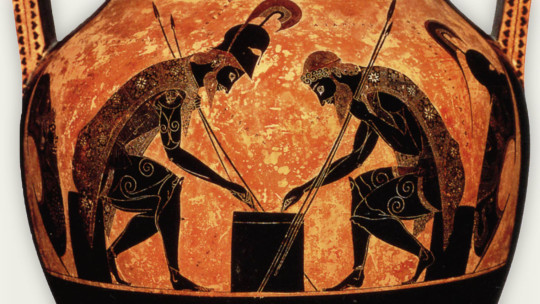
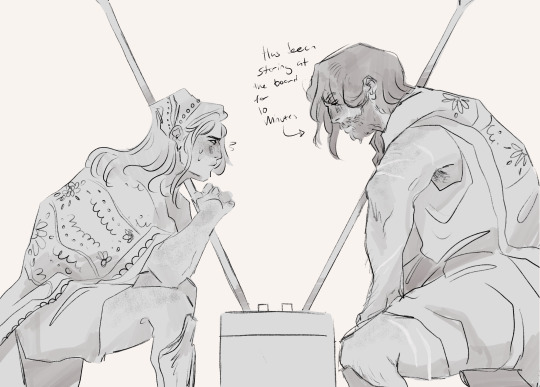
Doodle of Achilles and Ajax playing dice based on this black figure vase painting by Exekias
#Quality cousin time#Is ajax huge or is Achilles just tiny: the game#The only straight haired Homeric heroes I’ve drawn#Achilles is anticipating dodging the board when Ajax inevitably flips it#Ajax the greater#Achilles#greek myth#my art#greek myth art#achilles art#This vase has such foreboding energy yknow with the full black border and the fact that neither of them live to see the end of the war#And a moment of downtime in the Trojan war between two family members yknow#My doodle does NOT have the same energy lmao#The iliad#trojan war
2K notes
·
View notes
Text
Shoutout to Diomedes fans with a small reminder that Diomedes stood his ground against Achilles on full rage mode when he saw him beating Thersites to death (and he was the only one who dared to)
#greek mythology#tagamemnon#post iliad technically?#achilles#diomedes#thersytes#thersites#diomedes king of argos#diomedes of argos#epic cycle#achilles vs diomedes#diomedes vs achilles#rage of achilles#heroes of trojan war#trojan war#aithiopis#aethiopis#iliad#the iliad#homer iliad#posthomerica
189 notes
·
View notes
Text
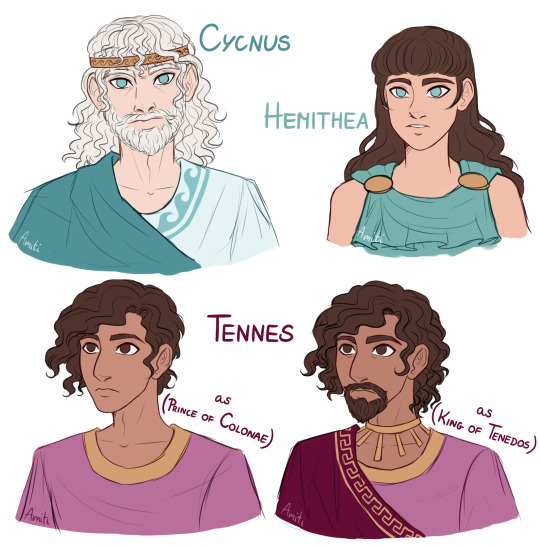
I posted about Troilus last week so I decided to clean up my old sketches of Tennes, his sister and their father for this week.
Cycnus was the king of Colonae (located near Troy) and the son of Posaidon. (His name means swan btw)
He married the princess of Troy named Procleia (she was either daughter or granddaugter Laomedon) and had 2 childern with her: Tennes and Hemithea. Some versions say that Tennes was son of Apollo and he was only being rised by Cycnus (this is going to be important later)
At some point Procleia died and Cycnus remarried. His new wife Philonome, fell in love with Tennes and when he regected her she told Cycnus that Tennes forced himself on her (or tried to). A flute-player named Eumolpus confirmed her version of events.
Enraged by this Cycnus put both Tennes and Hemithea in a wooden chest and throw them into the sea (some versions say Hemithea shared her brother's punishment willingly).
They made it safely to an island called Leukophrys (it was later renamed Tenedos) and become the new rulers of the land.
Cycuns somehow learned that his wife's accusations against Tennes were false so he buried her alived while Eumolpus (the flute-player) was stoned to death.
After founding out that his childern survived Cycnus sailed to Tenedos to ask Tennes' forgivnes and take them both home.
Tennes however didn't care for his apology and he cut the anchor ropes off the ship with an axe so Cycnus couldn't step on the land.
Tennes ruled his island for some time, he established a law which stated that the folse accusations were punisheble by death by an axe (Tennes really liked axes, didn't he).
Also flute-players were forbided from entering either the temples or the entire island.
Okay remember when I said earlier that Apollo was Tennes' real father and it was important? Yeah we're getting there.
When the Greeks were traveling to Troy they stopped on Tenedos. Thetis told Achilles that he can't kill the king of the Island because whoever kills Tennes will be killed by his father Apollo. Achilles however tried to force himself on Hemithea. Tennes tried to defend his sister but he was killed by Achilles. When Achilles realized who he killed he also killed his servant because the servant (who was sent to him by Thetis to remind him not to kill the king) failed to inform Achilles that he's about to kill the man he's not supossed to.
Some versions also mention a bigger fight and say that Tennes was also protecting his country. Most of the sources don't mention what happened to Hemithea afterwords but one text claim that she was swallowed by the earth which saved her from being violated by Achilles. Another says that she was killed by Achilles but don't mention anything about the assault.
It was forbidden to say Achilles name in the tample build after Tennes death.
Meanwhile Cycnus joined the Trojan forces and fought alongside Hector (who was his first wife's nephew btw, which means that Hector and Tennes were first cousins). Like his childern he was killed by Achilles, on the first day of the war.
#Tennes#Hemithea#Cycnus#Apollo#Troy#trojan war#achilles#greek myth art#greek mythology#Hector#greek heroes#greek gods#my art#character designs#children of apollo
279 notes
·
View notes
Text
Odysseus of Troy au
More on my Odysseus of Troy au:
Palladion heist (Palladium? Idk which spelling is correct):
In this au Diomedes goes on a solo mission into Troy to steal Athena’s statue.
In one version Diomedes pulls off the mission without a hitch.
The next day Odysseus overhears his guards talking about how the Palladion has gone missing and that the Greeks must have stolen it.
Odysseus is torn between being impressed and being pissed off that a Greek soldier got into Troy and didn’t try to rescue him. After the war Ody meets Diomedes, finds out he is responsible for the Palladion theft and they instantly become friends.
Another option is that Diomede’s theft of the statue coincides with one of Odysseus’ escape attempts.
Odysseus finally manages to get out of the room he was imprisoned in, and is sneaking through Troy in the middle of the night. He bumps into Diomedes making off with the Palladion.
They are about to escape together when they have a dispute over what to do with the Palladion. Ody says they should leave it as it’s slowing Dio down+ Odysseus escaping Troy should be the main objective here. Dio thinks it might still be important to secure Athena’s favour.
As they are whisper-yelling at each other in the middle of the streets some Trojan guards are alerted. Dio just manages to escape with the statue as Odysseus distracts the guards. Thus Odysseus gets recaptured and spends the next few days seething and wishing he could stab Diomedes.
Diomedes returns to the Greek camp a hero for stealing the statue. He is a bit embarrassed to mention that he met Odysseus and could have ended the war if he had got him out of troy
I’m probably not going to write an actual fic of this but if anyone wants to write anything in this au or make art please tag me cause I’d love to see it! link to first part of this au:
#odysseus#diomedes#incorrect iliad#greek myth#tagamemnon#trojan war#the iliad#Athena is questioning why two of her chosen heroes lose all brain cells when placed in close proximity#Nestor definitely gave Diomedes a disappointed lecture#odysseus of troy au#my posts
112 notes
·
View notes
Text
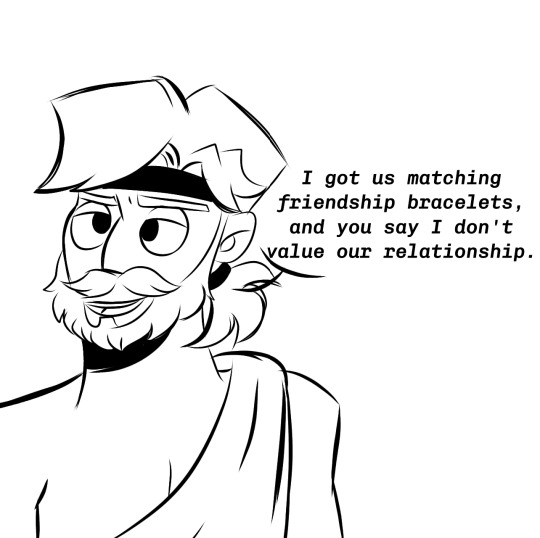

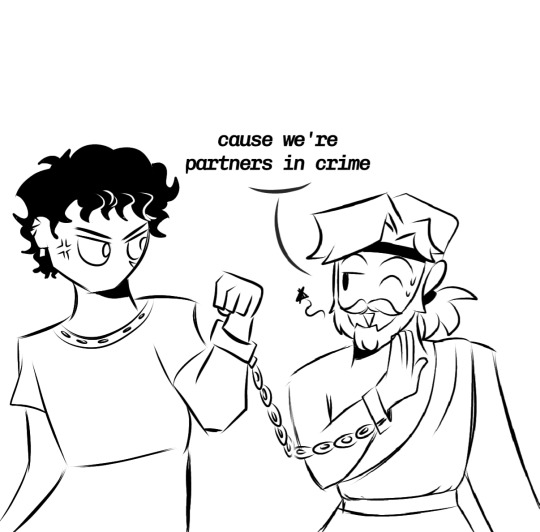
Because i don't know were else to publish this
#Odysseus#the Iliad#homer#Greek mythology#epic the musical#diomedes#greek heroes#doodle#art#My first and probably only tumblr post#tagamemnon#trojan war
248 notes
·
View notes
Text
The Achaeans.
My designs for them, this will be pt 1 ofc
First will be: Achilles, Patroclus, Agamemnon, Menelaus, Odysseus, Diomedes.
Next will be: Ajax the greater, Ajax the lesser, Teucer, Nestor, Idomeneus, Antilochus.

Achilles of Phthia.

Patroclus of Opus.

Agamemnon of Mycenae.

Menelaus of Sparta.

Odysseus of Ithaca.

Diomedes of Argos.
#iliad#tagamemnon#epic cycle#Achilles#Patroclus#agamemnon#menelaus#odysseus#diomedes#greek mythology#the Iliad#Greek mythology art#art#Achaean#Achaeans#the Achaeans#greek heroes#Blue-lotus arts#trojan war#the trojan war
34 notes
·
View notes